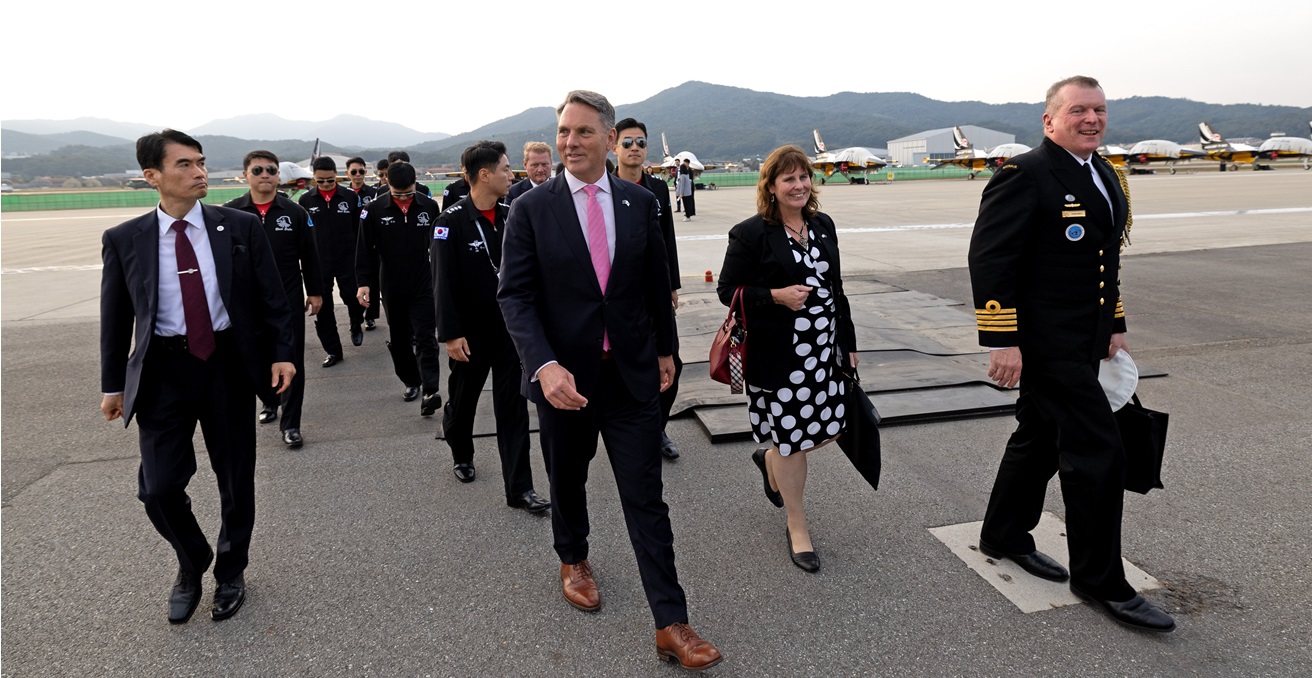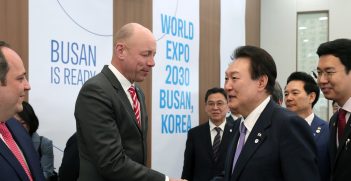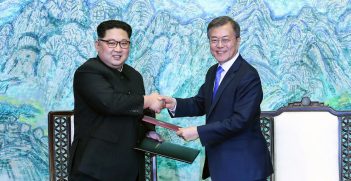The Republic of Korea-Australia Security Nexus

Australia and the Republic of Korea (ROK) share many security interests, the least not being sustaining the rules based international order. More recent developments strengthening the bilateral relationship showcases its increased importance for regional security collaboration and cooperation.
In a turbulent and multipolar world, United States’ military commitments and resources are being highly stretched. Support for key allies in Europe (the Ukraine) and the Middle East (Israel), combined with a US Congress increasingly upset over its country’s multi-trillion dollar debt, means that traditional regional allies in Europe and Asia will be required to step up their contributions to democracies’ collective security.
In the Indo-Pacific, the recent intensification of Australia-ROK (Republic of Korea) defence ties exemplifies this reality. While perhaps less prominent than the long-standing Australia-Japan security relationship stretching over the past few decades, the Australia-ROK dyad has nevertheless assumed a distinct character of its own. Accelerated diplomatic security ties, more joint military exercises to develop greater force interoperability, and enhanced defense industrial relations underpin this trend. Driving such interaction is the imperative for democratic middle powers such as Australia and the ROK to apply their strategic collaboration and defense resources in ways that will maximise their ability to meet their mutual regional security interests.
What are those interests? At a September 2023 Australia-Korea Future Forum convened in Canberra, Australia’s Assistant Minister for Foreign Affairs, Tim Watt, offered an itinerary of common foreign policy and security interests shared by his country and the ROK. These included the preservation of a rules-based Indo-Pacific and global orders where sovereignty is respected; the promotion of free trade throughout the Indo-Pacific region and internationally; and a dedication to strengthening stability in the South Pacific region. More specifically, the Common Strategic Partnership document signed between the two countries in December 2021 during ROK President Moon Jae-in’s visit to Australia underscored the two countries’ common democratic values, their need to safeguard maritime sea lanes and domains, the imperative for collaborating in non-traditional security sectors such as cyber security and climate change; and balancing their support for effective multilateral cooperation and institutions with their respective bilateral security alliances with the United States. Peace and security on the Korean peninsula was also designated as a key objective by the signatories. This initiative followed an already strong foundation of Australia-ROK security diplomacy, including the Memorandum of Understanding (MOU) on Development Cooperation between Australia and the Republic of Korea (2009); the Blueprint for Defense and Security Cooperation between Australia and the Republic of Korea (2015), and the advent of annual ROK-Australia Foreign and Defense Minsters “2+2” meetings (2017).
The election of conservative South Korean president Yoon Suk-yeol in May 2022 intensified South Korea’s determination to become a significant player in Indo-Pacific geopolitics. The Yoon administration released its Strategy for a Free, Peaceful, and Prosperous Indo-Pacific Region (KIPS) in December 2022, a new Defence White Paper in February 2023, and a National Security Strategy in June 2023. Together, these documents heralded South Korea’s self-acclaimed status as a “Global Pivotal State.” Exemplifying this trend was the Yoon government’s announcement of an upgraded regional geopolitical posture including an accelerated New Southern Policy (NSP). The NSP, originally formulated in 2017, included more explicit ROK support for the Quadrilateral Security Dialogue (the United States, Japan, Australia and India constitute that grouping’s formal membership). It marked a reduced South Korean deference to long-standing Chinese sensitivities towards the QSD and a greater ROK willingness to support more bilateral security policy coordination with its historic rival, Japan.
From Australia’s perspective, as noted by a recently released United States Studies Centre report, a more sharply demarcated NSP underscored a greater consistency in South Korean foreign and strategic policy which could be applied by both Australia and the ROK to yield issue-specific and sustained “collective solutions [by these two regional Indo-Pacific middle powers) to shared regional challenges.” It also signalled “Australia’s return as an actor of consequence and value in Korean strategic thinking” after a decade’s hiatus where Seoul’s major strategic attention was largely (if not exclusively) directed toward confronting and modifying South Korea’s tensions with North Korea. Seoul understands that Australia and South Korea, as two key middle powers in the Indo-Pacific, share mutual interests. The KIPS notes that the Yoon government will seek to supplement upgraded bilateral initiatives involving Canberra with opportunities for minilateral cooperation “to sustain regional order and focus on ‘spoke-to-spoke relationships’ with traditional U.S. regional allies like Australia and Japan.”
These mutual interests and objectives are already being pursued in various policy sectors. Defence and Foreign Ministers “2+2” consultations have been ongoing since 2013. An array of other bilateral strategic deliberations exists and is expanding. A Memorandum of Understanding on defence, research, development, testing, and evaluation was signed in 2019 but has yet to be operationalised to a truly viable extent. Individual defence industrial projects are ongoing with the Hanwha landing contracts for producing field artillery and howitzers near Geelong for use by the Australian Defence Force. Australia has provided some early warning and control (AEW&C) aircraft to the South Korean navy. While defence industrial cooperation remains intermittent (with a history of cancelled contracts on the Australian side as force requirements change), the possibilities for intensified cooperation in this sector remain promising.
Challenges remain for both Australian and South Korean policymakers to overcome if their bilateral security relationship is to become more effective and comprehensive. One is for the two sides to reconcile their respective geographies more fully. South Korea has initiated moves along such lines, including launching a campaign to engage politically with South Pacific Island states (a Korea-Pacific Islands Summit was hosted by President Yoon in Seoul during late May 2023). Understandably, however, Seoul remains most preoccupied with the North Korean nuclear threat and with a China intent on undermining the US-ROK alliance. Australia shares South Korean concerns about South Pacific Island state instability. But while both Seoul and Canberra view growing Chinese military power with concern, the former is more relaxed than the latter about co-existing with an increasingly powerful Beijing. Moreover, while the Yoon government has made considerable inroads in repairing historically tense relations with Japan, there is little guarantee that future South Korean governments will be able or inclined to perpetuate or build upon this momentum. Australia, in contrast, continues to regard Japan as its major Indo-Pacific security partner apart from the United States.
The election of Donald Trump or another populist to the American presidency in November 2024 could also work to aggravate Australia-ROK security relations. The legacy of President Trump’s relations with South Korea was not a happy one as defence burden-sharing issues, and that president’s efforts to court North Korean president Kim Jong-un, dominated the Trump administration’s approach to the Korean peninsula during its term in office. The return of a more US populist foreign policy could prompt the South Koreans to consider developing indigenous nuclear force capabilities. This would contradict Australia’s official and long-standing support for nuclear arms control and disarmament, notwithstanding it’s AUKUS agreement with the US and UK to develop nuclear propelled submarines, albeit with conventional weapons systems.
Overall, the Australia-ROK security nexus has recently commanded greater attention in both Australia and South Korea. Its potential benefits for both countries are increasingly recognised. To reap the full benefits of an upgraded bilateral security relationship, however, neither Australian nor South Korean policymakers can allow complacency to prevail over their mutual diligence in developing it.
William T. Tow is Emeritus Professor at the Coral Bell School of Asia Pacific Affairs, Australian National University. He was previously a Professor of International Relations in the Coral Bell School’s Department of International Relations. His research interests include Indo-Pacific alliance politics, strategic studies and U.S. foreign policy.
This article is published under a Creative Commons Licence and may be republished with attribution.





